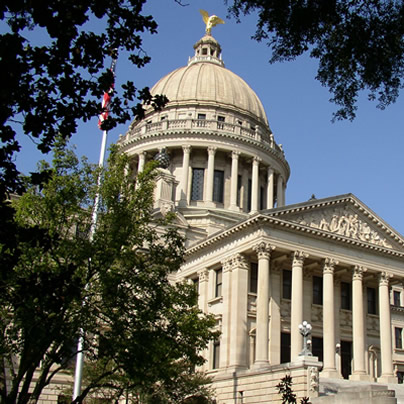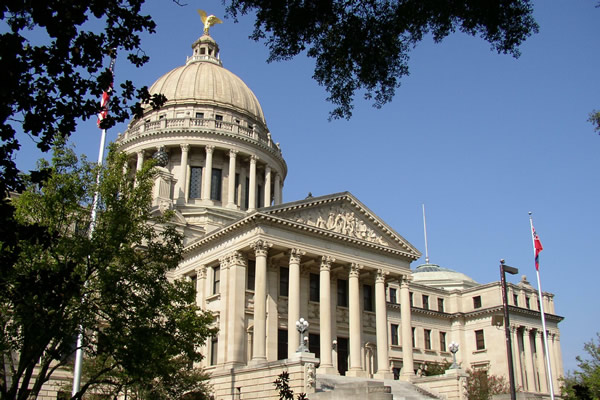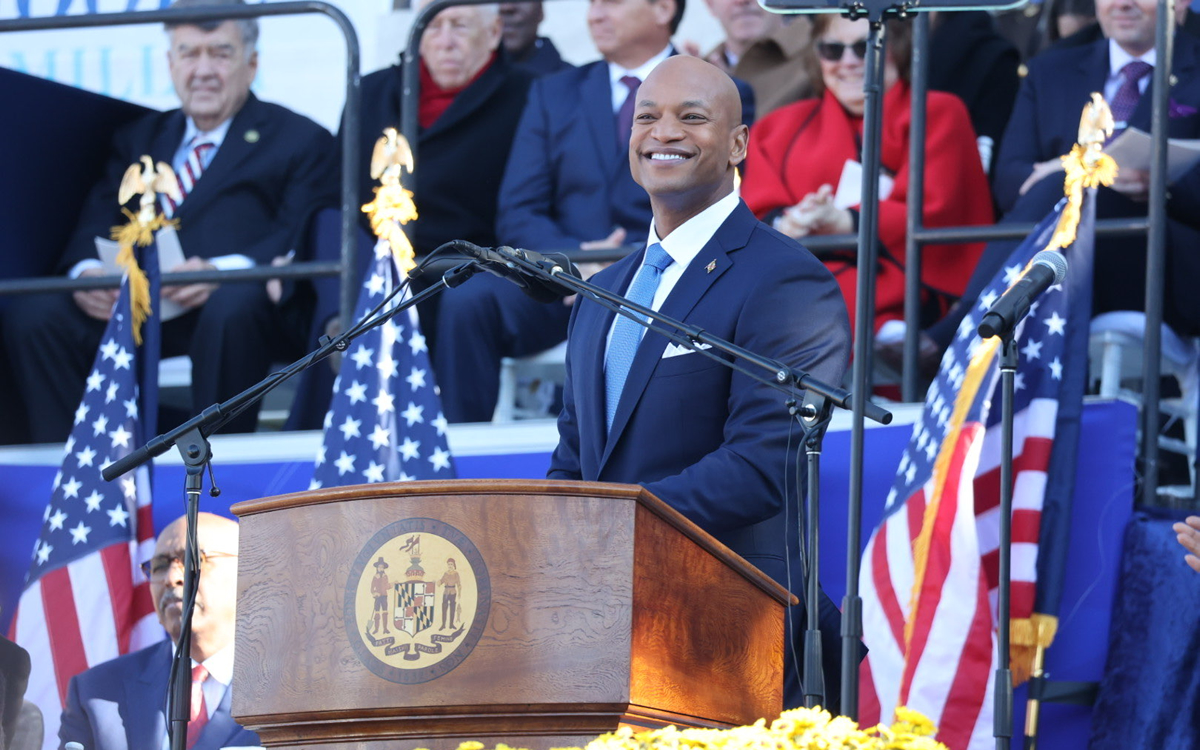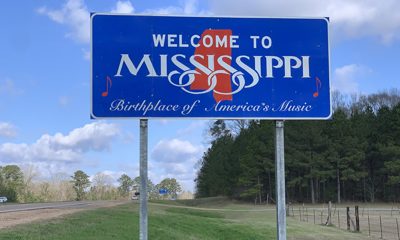News
Mississippi legislature approves ‘turn away the gays’ bill
Legislation along the lines of Arizona bill vetoed by Jan Brewer


The Mississippi legislature has approved a “turn away the gay” bill. (Photo by Chuck Kelly; courtesy Creative Commons)
The Mississippi legislature approved late Tuesday a “turn away the gays” measure that would enable businesses and individuals in the state to discriminate against or refuse services to LGBT people on religious grounds — making a signature from the governor the last remaining step before the bill becomes law.
In a development that largely went unnoticed on the national stage, the State House and Senate on the same day both approved a conference report for S.B. 2681, the Religious Freedom Restoration Act. The vote in the Republican-controlled House was 78-43 and the vote in the Republican-controlled Senate vote was 38-14.
Much like the controversial Arizona bill known as SB 1062 vetoed by Gov. Jan Brewer, the six-page legislation never once mentions the words “sexual orientation,” “gender identity” or “gay.” Still, LGBT advocates insist the legislation would have the effect of allowing discriminatory practices against LGBT people seeking services in Mississippi.
Sarah Warbelow, the Human Rights Campaign’s state legislative director, said the bill would in essence make “LGBT people strangers to the law.”
“Before Mississippi has had the opportunity to robustly discuss the lived experiences of LGBT people, this bill would hollow out any non-discrimination protections at the local level or possible future state-wide protections,” Warbelow said. “Just as we’ve seen in other states, this bill is bad for business, bad for the state’s reputation, and most of all, bad for Mississippians. Gov. Bryant must veto the measure.”
Notably, the measure also contains language modifying the state seal in a way adds to it the words “In God We Trust.” The bill also has language that says nothing in the measure “shall create any rights by an employee against an employer if the employer is not the government,” which is different from the Arizona legislation.
Now that the legislature has approved the bill, the last remaining step before it becomes law is a signature from Mississippi Gov. Phil Bryant, who’s known for his conservative views as chief executive of a state in the Deep South. Still, Brewer has the same reputation, but she vetoed the Arizona bill after pressure from LGBT advocates, businesses, religious groups and faith leaders.
If Bryant signs the bill, it’ll go into effect on July 1. Bryant’s office didn’t immediately respond to the Washington Blade’s request to comment on whether he’ll sign the legislation.
It should be noted that sexual orientation and gender identity currently aren’t protected under civil rights law in Mississippi. Based on state and federal law, individuals and businesses could refuse services to LGBT people, such as services for a same-sex wedding, without fear of reprisal regardless of whether or not the bill signed into law.
No municipalities in Mississippi have non-discrimination ordinances, although Starkville, Hattiesburg and Oxford have all passed pro-LGBT resolutions.
Still, according to the Human Rights Campaign, the measure could undermine future state non-discrimination laws, interfere with licensing organizations that have professional regulations protecting LGBT individuals and undermine public university non-discrimination policies.
The measure is part of a nationwide trend of “turn away the gay” bills advancing in state legislatures. Including the one vetoed in Arizona, other similar bills in Georgia, Idaho, Maine, and Ohio were rejected. But similar bills are still pending in Missouri and Oklahoma.
The measure advanced through the legislature after the Mississippi House voted last month to strike text related to religious liberty and instead created a study committee on how to pass such a bill in the future. Despite changes made by the House, the conference committee produced a report that advocates say would subject LGBT people to discrimination anyway.
The legislature’s passage of the bill has won praise from at least one anti-gay group, which says the legislation is along the lines of a federal religious exemption law introduced by the late Sen. Edward Kennedy and then-Rep. Chuck Schumer before being passed by Congress and signed into law by President Clinton.
Tony Perkins, president of the Family Research Council, said the measure simply ensures religious freedom for individuals and businesses in Mississippi.
“This is a victory for the First Amendment and the right to live and work according to one’s conscience,” Perkins said. “This commonsense measure was a no-brainer for freedom, and like the federal RFRA, it simply bars government discrimination against religious exercise. The legislature gave strong approval to a bill that declares that individuals do not have to trade their religious freedom for entrance into public commerce.
Morgan Miller, a spokesperson for the American Civil Liberties Union of Mississippi, told the Blade although lawmakers attempted to align the Mississippi bill with federal law, the end result “falls short.”
“This bill still could open the door for someone who wants to use their religion to discriminate against others,” Miller said. “It exposes virtually every branch and office of the government to litigation; our state will have to spend taxpayer money to defend lawsuits. It’s unnecessary: the Mississippi legislature has been unable to articulate why this law is needed in our state.”

Maryland Gov. Wes Moore on Thursday signed a bill that seeks to combat efforts to ban books from state libraries.
House Bill 785, also known as the Freedom to Read Act, would establish a state policy “that local school systems operate their school library media programs consistent with certain standards; requiring each local school system to develop a policy and procedures to review objections to materials in a school library media program; prohibiting a county board of education from dismissing, demoting, suspending, disciplining, reassigning, transferring, or otherwise retaliating against certain school library media program personnel for performing their job duties consistent with certain standards.”
Moore on Thursday also signed House Bill 1386, which GLSEN notes will “develop guidelines for an anti-bias training program for school employees.”

The Mexican Senate on Thursday approved a bill that would ban so-called conversion therapy in the country.
Yaaj México, a Mexican LGBTQ rights group, on X noted the measure passed by a 77-4 vote margin with 15 abstentions. The Chamber of Deputies, the lower house of Mexico’s congress, approved the bill last month that, among other things, would subject conversion therapy practitioners to between two and six years in prison and fines.
The Senate on its X account described conversion therapy as “practices that have incentivized the violation of human rights of the LGBTTTIQ+ community.”
“The Senate moved (to) sanction therapies that impede or annul a person’s orientation or gender identity,” it said. “There are aggravating factors when the practices are done to minors, older adults and people with disabilities.”
Mexico City and the states of Oaxaca, Quintana Roo, Jalisco and Sonora are among the Mexican jurisdictions that have banned the discredited practice.
The Senate in 2022 passed a conversion therapy ban bill, but the House of Deputies did not approve it. It is not immediately clear whether President Andrés Manuel López Obrador supports the ban.
Canada, Brazil, Belgium, Germany, France, and New Zealand are among the countries that ban conversion therapy. Virginia, California, and D.C. are among the U.S. jurisdictions that prohibit the practice for minors.
The White House
Four states to ignore new Title IX rules protecting transgender students
Biden administration last Friday released final regulations

BY ERIN REED | Last Friday, the Biden administration released its final Title IX rules, which include protections for LGBTQ students by clarifying that Title IX forbids discrimination based on sexual orientation and gender identity.
The rule change could have a significant impact as it would supersede bathroom bans and other discriminatory policies that have become increasingly common in Republican states within the U.S.
As of Thursday morning, however, officials in at least four states — Oklahoma, Louisiana, Florida, and South Carolina — have directed schools to ignore the regulations, potentially setting up a federal showdown that may ultimately end up in a protracted court battle in the lead-up to the 2024 elections.
Louisiana State Superintendent of Education Cade Brumley was the first to respond, decrying the fact that the new Title IX regulations could block teachers and other students from exercising what has been dubbed by some a “right to bully” transgender students by using their old names and pronouns intentionally.
Asserting that Title IX law does not protect trans and queer students, Brumley states that schools “should not alter policies or procedures at this time.” Critically, several courts have ruled that trans and queer students are protected by Title IX, including the 4th U.S. Circuit Court of Appeals in a recent case in West Virginia.
In South Carolina, Schools Supt. Ellen Weaver wrote in a letter that providing protections for trans and LGBTQ students under Title IX “would rescind 50 years of progress and equality of opportunity by putting girls and women at a disadvantage in the educational arena,” apparently leaving trans kids out of her definition of those who deserve progress and equality of opportunity.
She then directed schools to ignore the new directive while waiting for court challenges. While South Carolina does not have a bathroom ban or statewide “Don’t Say Gay or Trans” law, such bills continue to be proposed in the state.
Responding to the South Carolina letter, Chase Glenn of Alliance For Full Acceptance stated, “While Supt. Weaver may not personally support the rights of LGBTQ+ students, she has the responsibility as the top school leader in our state to ensure that all students have equal rights and protections, and a safe place to learn and be themselves. The flagrant disregard shown for the Title IX rule tells me that our superintendent unfortunately does not have the best interests of all students in mind.”
Florida Education Commissioner Manny Diaz also joined in instructing schools not to implement Title IX regulations. In a letter issued to area schools, Diaz stated that the new Title IX regulations were tantamount to “gaslighting the country into believing that biological sex no longer has any meaning.”
Governor Ron DeSantis approved of the letter and stated that Florida “will not comply.” Florida has notably been the site of some of the most viciously anti-queer and anti-trans legislation in recent history, including a “Don’t Say Gay or Trans” law that was used to force a trans female teacher to go by “Mr.”
State Education Supt. Ryan Walters of Oklahoma was the latest to echo similar sentiments. Walters has recently appointed the right-wing media figure Chaya Raichik of Libs of TikTok to an advisory role “to improve school safety,” and notably, Raichik has posed proudly with papers accusing her of instigating bomb threats with her incendiary posts about LGBTQ people in classrooms.
The Title IX policies have been universally applauded by large LGBTQ rights organizations in the U.S. Lambda Legal, a key figure in fighting anti-LGBTQ legislation nationwide, said that the regulations “clearly cover LGBTQ+ students, as well as survivors and pregnant and parenting students across race and gender identity.” The Human Rights Campaign also praised the rule, stating, “rule will be life-changing for so many LGBTQ+ youth and help ensure LGBTQ+ students can receive the same educational experience as their peers: Going to dances, safely using the restroom, and writing stories that tell the truth about their own lives.”
The rule is slated to go into effect Aug. 1, pending any legal challenges.
****************************************************************************

Erin Reed is a transgender woman (she/her pronouns) and researcher who tracks anti-LGBTQ+ legislation around the world and helps people become better advocates for their queer family, friends, colleagues, and community. Reed also is a social media consultant and public speaker.
******************************************************************************************
The preceding article was first published at Erin In The Morning and is republished with permission.
-

 State Department4 days ago
State Department4 days agoState Department releases annual human rights report
-

 District of Columbia2 days ago
District of Columbia2 days agoCatching up with the asexuals and aromantics of D.C.
-

 South America2 days ago
South America2 days agoArgentina government dismisses transgender public sector employees
-

 Politics5 days ago
Politics5 days agoSmithsonian staff concerned about future of LGBTQ programming amid GOP scrutiny










